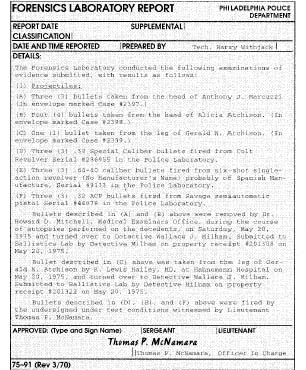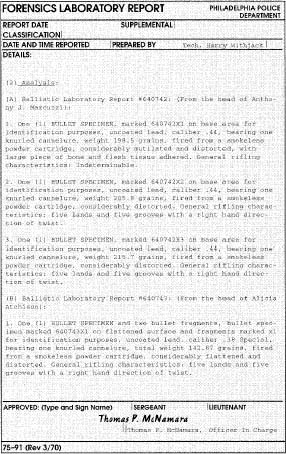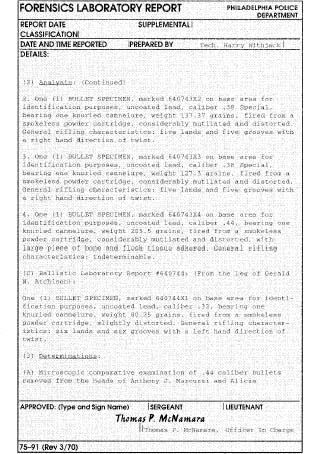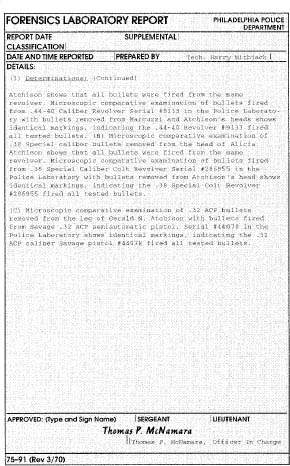Badge of Honour 06 - The Murderers (46 page)
Read Badge of Honour 06 - The Murderers Online
Authors: W.E.B Griffin

“You working the job, Detective?”
“The assigned detective’s not here. But I’m working it.”
“What I got may not be anything, but I thought it was worth telling you.”
“What have you got, Bailey?”
“A fellow named James Howard Leslie—he’s a junkie, done some time for burglary—was burning garbage in his backyard.”
“And?” Detective Kramer asked, somewhat impatiently.
“I put the fire out, and then I got a good look at what he was burning. I don’t know…”
“What, Bailey?”
“There was a photograph of Officer Kellog and his wife, on their wedding day, in his garbage.”
There was a moment’s silence, and then Detective Kramer asked, very carefully: “How do you know it was Officer Kellog?”
“There’s a sign on the wall behind him. ‘Good Luck Officer Kellog From the Seventeenth District.’ And I remembered his picture in the newspapers.”
“Where’s the picture now?”
“I left it there.”
“Where’s the guy…Leslie, you said?”
“In my car. I arrested him for setting an unlawful fire.”
“Where are you?”
“Behind his house. In the alley. The 1900 block of Sedgwick Street.”
“I’ll be there in ten minutes. Don’t let him out of your sight, don’t let anybody near where you found the picture, and don’t touch nothing you don’t have to.”
Bailey hung up the telephone, then called the Thirty-ninth District and asked for a supervisor to meet him at the scene.
“What have you got, Bailey?” the Corporal inquired.
“A garbage burner,” Bailey said, and hung up.
He nodded at Leslie’s Puerto Rican woman, then walked back through the yard to his car and got behind the wheel.
“Hey, Officer, what’s happening?” Mr. Leslie inquired, sliding forward with some difficulty on the seat to get closer to the fucking cop.
“You under arrest, Speed,” Officer Bailey replied. “For setting a fire in your backyard.”
“Oh, Jesus Christ, man! For burning some fucking garbage?”
“If I was you, I’d just sit there and close my mouth,” Officer Bailey replied.
The visitor would then be able to see the Mayor deep in concentration, dealing with some document of great importance laid out on his massive desk. After a moment or two, the Mayor would glance toward the door, look surprised and apologetic, and rise to his feet.
“Please excuse me,” he would say. “Sometimes…”
Visitors would rarely fail to be impressed with the fact that the Mayor was tearing himself from Something Important to receive them.
This afternoon, however, on learning that Chief Inspector Matt Lowenstein had asked for an appointment for himself and Inspector Peter Wohl, His Honor had decided to deviate from the normal routine.
While he could not be fairly accused of being paranoid, the threatened resignation of Chief Lowenstein had caused the Mayor to consider that he really had few friends, people he could really trust, and that Matt Lowenstein was just about at the head of that short list.
“When he comes in, Annette,” the Mayor ordered, “you let me know he’s here, and I’ll come out and get him.”
Such a gesture would, the Mayor believed, permit Chief Lowenstein to understand the high personal regard in which he was held. And Peter Wohl would certainly report the manner in which Lowenstein had been welcomed to the Mayor’s office to his father. The Mayor was perfectly willing to admit—at least to himself—that his rise through every rank to Commissioner of the Philadelphia Police Department—which, of course, had led to his seeking the mayoralty—would not have been possible had not Chief Inspector Augustus Wohl covered his ass in at least half a dozen really bad situations.
And when he thought about that, he realized that Inspector Peter Wohl was no longer a nice young cop, but getting to be a power in his own right. And that he could safely add him to the short list of people he could trust.
He was pleased with his decision to greet Lowenstein and Wohl in a special manner.
And was thus somewhat annoyed when he pulled the door to his office open, a warm smile on his face, his hand extended, and found that Chief Lowenstein was at Annette’s desk talking on the telephone.
Finally, Chief Lowenstein hung up and turned around.
“Sorry,” Lowenstein said.
“What the hell was that?” Carlucci asked, somewhat sharply.
“Henry Quaire,” Lowenstein said. “There may be a break in the Kellog murder.”
“What?” the Mayor asked.
He’s not being charming
, Peter Wohl thought.
When Lowenstein told him that, he went right back on the job. He’s a cop, and if there is one thing a cop hates worse than a murdered cop it’s a murdered cop with no doers in sight
.
“A uniform in the Thirty-ninth working his beat came across a critter, junkie, petty criminal with a record six feet long, including burglaries, burning garbage in his backyard. In the garbage was Officer Kellog’s wedding picture. The uniform called Homicide.”
“There was mention of a wedding picture in the 49s,” Carlucci said. “In a silver frame.”
“Right,” Lowenstein said.
“Where else would he get a picture of Kellog?” Carlucci asked, thoughtfully rhetoric. “Have you got the frame?”
“Yeah. That’s why Quaire called me. We got a search warrant. They found not only a silver frame, but a dozen—thirteen, actually—tape cassettes. They were in the fire, but maybe Forensics can do something with them. If Mrs. Kellog can identify the frame, or there’s something on the tapes…”
“Where’s the critter?”
“Right now, he’s on his way from the Thirty-ninth to Homicide,” Lowenstein said.
“Who’s going to interview him?”
Lowenstein shrugged. “Detective D’Amata is the assigned detective.”
“Peter, do you have Jason Washington doing anything he can’t put off for a couple of hours?” the Mayor asked, innocently.
That is
, Wohl noted mentally,
the first time the Mayor has acknowledged my presence
.
“You want to take it away from D’Amata?” Lowenstein asked.
“I’d like an arrest in that case,” Carlucci said. “If you think it would be a good idea to have Washington talk to this critter, Matt, I’d go along with that.”
“Shit,” Lowenstein said. “You find Washington, Peter,” he ordered. “I’ll call Quaire.”
“Yes, sir,” Peter said.
“Only if you think it’s a good idea, Matt,” the Mayor said. “It was only a suggestion.”
“Yeah, right,” Lowenstein said, and walked back to Mrs. Annette Cossino’s desk and reached for one of the telephones.
“D’Amata will understand, Peter,” the Mayor said.
“Yes, sir,” Peter said. “I’m sure he will.”
“Annette,” the Mayor called. “Call the Thirty-ninth. Tell the Commanding Officer I want him and this uniform standing by to come here if I need them.”
“Yes, Mr. Mayor,” Mrs. Cossino said.
“Henry,” Lowenstein said into the telephone. “When they bring in the critter from the Thirty-ninth, handcuff him to a chair in an interview room and leave him there until Washington shows up. Wohl’s putting the arm out for him now. I think that’s the way to handle the interview, and the Mayor agrees.”
He hung the phone up and turned to face Carlucci.
“Are you pissed at me, Matt?” Carlucci, sounding genuinely concerned, asked.
“When am I not pissed at you?” Lowenstein said. “It goes with the territory.”
“You don’t think it was a good idea?”
“That’s the trouble. I think it was a very good idea,” Lowenstein said.
“Sergeant Washington is en route to the Roundhouse, Mr. Mayor,” Wohl repeated.
“Great!” Carlucci said enthusiastically. Then he smiled broadly. “Let’s do this all over.”
“What?” Lowenstein asked in confusion.
“Well, Chief Lowenstein,” Carlucci said, and grabbed Lowenstein’s hand and pumped it. “And Inspector Wohl! How good of you both to come see me! It’s always a pleasure to see two of the most valuable members of the Police Department here in my office. Come in and have a cup of coffee and tell me how I may be of assistance!”
Lowenstein shook his head in resignation.
“Jesus Christ!”
“What
can
I do for you, Chief?”
“Stop the bullshit, Jerry,” Lowenstein said, chuckling.
“OK,” Carlucci said agreeably. “What’s up?”
“Last night, a couple of South detectives saw one John Francis Foley pass a package to one Gerald North Atchison. Shortly thereafter, Detective Payne of Special Operations saw Mr. Atchison throw said package off a pier in Chester—”
“How did South detectives get involved in this?” Carlucci asked, and Wohl saw that he had slipped back into being a cop.
“Payne was surveilling Atchison. He ran into the South detectives and asked for their assistance.”
“OK,” Carlucci said thoughtfully. “Go on.”
“The package was retrieved early this morning by a police diver. The lab just came up with a positive ballistics match to the murder weapons.”
“Fingerprints?”
Lowenstein shook his head. “Weapons were cleaned. I thought I’d show it to you before I sent someone over to Tom Callis’s office with it.”
“Let me see,” Carlucci said, holding out his hand.
Lowenstein handed the Mayor an envelope. Carlucci made a “come in” gesture with his hand, walked ahead of them into his office, sat down at his desk, and opened the envelope.




